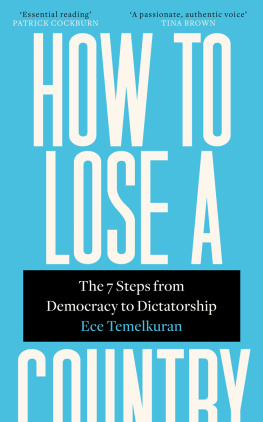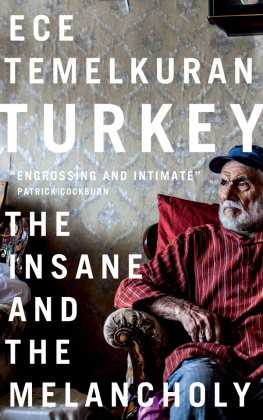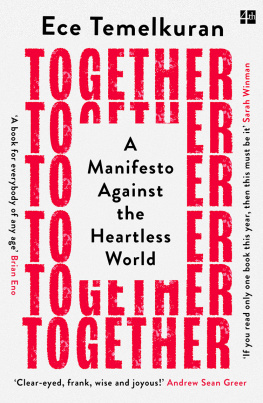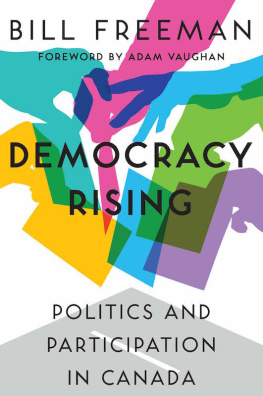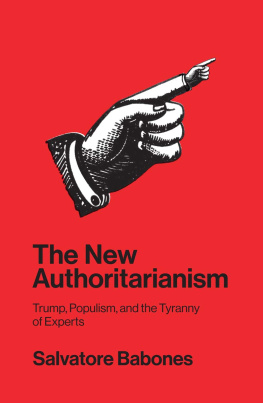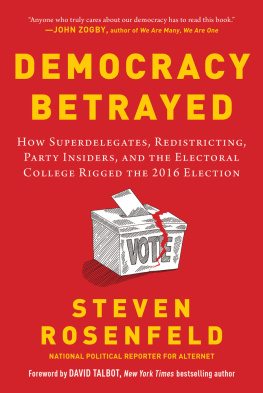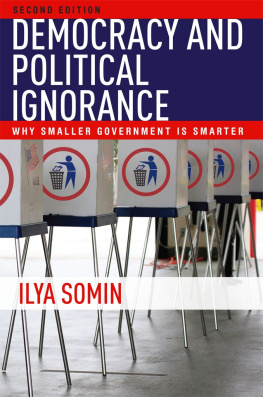4th Estate
An imprint of HarperCollinsPublishers
1 London Bridge Street
London SE1 9GF
www.4thestate.co.uk
This eBook first published in Great Britain by 4th Estate 2019
Copyright Ece Temelkuran 2019
Ece Temelkuran asserts her moral right to be identified as the author of this work
A catalogue record for this book is available from the British Library
All rights reserved under International and Pan-American Copyright Conventions. By payment of the required fees, you have been granted the non-exclusive, non-transferable right to access and read the text of this e-book on screen. No part of this text may be reproduced, transmitted, down-loaded, decompiled, reverse engineered, or stored in or introduced into any information storage and retrieval system, in any form or by any means, whether electronic or mechanical, now known or hereinafter invented, without the express written permission of HarperCollins.
Source ISBN: 9780008294014
Ebook Edition February 2019 ISBN: 9780008341770
Version: 2019-01-09
For Umut.
His name means hope in my mother tongue.
Contents
INTRODUCTION
The fighter jets are breaking the dark sky into giant geometric pieces as if the air were a solid object. Its 15 July 2016; the night of the attempted coup in Turkey. I am piling pillows up against the trembling windows. I guess theyve just dropped a bomb on the bridge, but I cant see any fire. People are talking on social media about the bombardment of the Parliament Building. Is this it? I ask myself. Is tonight the Reichstag fire for what remains of Turkish democracy and my country?
On TV, a few dozen soldiers are barricading the Bosporus bridge, shouting at the startled civilians: Go home! This is a military takeover!
Despite their huge guns, some of the soldiers are clearly terrified, and all of them look lost. The TV says its a military takeover, but this is not a coup as we know it. Coups usually wear a poker face theres no hustling or negotiating, and certainly no hesitation when it comes to using the heavy weaponry. The absurdity of the situation sees sarcasm kick in on social media. This kind of humour is not necessarily aiming for laughter; its more of a contest in bitter irony, which seems normal only to those engaged in it. The jokes mostly concern the idea that this is a staged act to legitimise the presidential system rather than the parliamentary one that President Recep Tayyip Erdoan has long been asking for, a change that would hand him even more power than he already has as the de facto sole ruler of the country.
The dark humour disappears as the skies over Istanbul and Ankara become busy hives of fighter jets. We are learning the language of war in real time. What Id thought was a bomb was actually a sonic boom the blast-like sound fighter jets make when they break the sound barrier. This is the proper terminology for the air breaking into giant pieces and raining down on us as fear: fear of realising that before the sun rises we might lose our country.
People in the capital city of Ankara are now trying to differentiate between sonic booms and the sound of real bombs hitting Parliament and the intelligence service headquarters. The catastrophe unfolding in front of our eyes is constantly blurred by the absurdity of the news reports on our screens. Live on air, MPs are running around Parliament trying to find the long-forgotten air-raid shelter, and when they finally do locate it, nobody can find the keys, while outside in the streets people dressed in their pyjamas are kicking tanks, cigarettes in their mouths, and shouting at the jets.
A communications explosion is occurring on our TV screens, and many of us know that this is very much not normal. Turkeys recent history has taught us that a coup starts with the army taking politicians into custody and shutting down news sources. Also, coups tend to happen in the early hours of the morning, not during television prime time. In this meticulously televised coup, government representatives appear across TV channels all night long, calling on the people to take to the streets and oppose the armys attempted takeover. The internet does not slow down in the way it usually does whenever something occurs to challenge the government; on the contrary, its faster than ever. Even so, the speed and intensity of the nights events do not allow the sceptics to properly process these strange details.
Erdoan communicates using FaceTime, with his messages broadcast on CNN Turk. He calls everyone out into the city centres. Like most people, I do not anticipate the governments supporters taking to the streets to confront the military. Since the founding of the modern Turkish republic in 1923, under Kemal Atatrk, the army has traditionally been the most respected institution in the country, if not the most feared. But apparently much has changed since the last military coup in 1980, when it was the leftists who resisted and were imprisoned and tortured; the presidents call resonates with thousands.
In no time the TV screens are showing the young, terrified soldiers being beaten and strangled to death by this mob. And that is when the never-ending sela from all the minarets in the country begins. Sela is a special prayer recited after death. It has such a shivering tone that even those who are not familiar with Muslim customs can tell that it is about the irreversible, the end. Tonight, sela is followed by loud announcements from minarets calling people to the streets in the name of God, to save the president, the democracy, the nation The tune of death now shares the sky with jets, the delirious Allahu akbars of Erdoan supporters and the soldiers cries for help. And I remember the poem that started everything: The minarets are our bayonets/The domes our helmets/The mosques our barracks/And the faithful our soldiers. It was Erdoan who recited the poem at a public event in 1999, leading to him being imprisoned for four months for inciting religious hatred, and transforming him first into a martyr for democracy, then a ruthless leader. And after seventeen years, on the night of the coup the poem sounds like a self-fulfilling prophecy, a promise that has been kept at the cost of a country.
We have learned over time that coups in Turkey end the same way regardless of who initiated them. Its like the rueful quote from the former England footballer turned TV pundit Gary Lineker, that football is a simple game played for 120 minutes, and at the end the Germans win on penalties. In Turkey, coups are played out over forty-eight-hour curfews, and the leftists are locked up at the end. Then afterwards, of course, another generation of progressives is rooted out, leaving the countrys soul even more barren than it was before.
As I watch the pro-government news channels throughout the night it becomes clearer by the minute that it is business as usual. Pictures and videos come through of arrested soldiers lying naked in the streets under the boots of civilians as leftists lay under army boots after the coup in 1980 and the news channels and the government trolls on social media, not at all paralysed like the rest of us, present us with the perspective they deem most appropriate: Thanks to Erdoans call, the people saved our democracy.
Allahu akbars multiply on my street, accompanied by machine-gun shots from the circulating cars. After so many years spent under AKP rule, devotion to the army has apparently been replaced by religious commitment to Erdoan. We are watching his face and name become the emblems of the new Turkey well wake up to. Beneath the madness and the noise a carefully crafted propaganda machine is fully operational, already preparing the new political realm that will come into being in the morning. And having long been a critic of Erdoans regime, as dawn breaks it becomes

